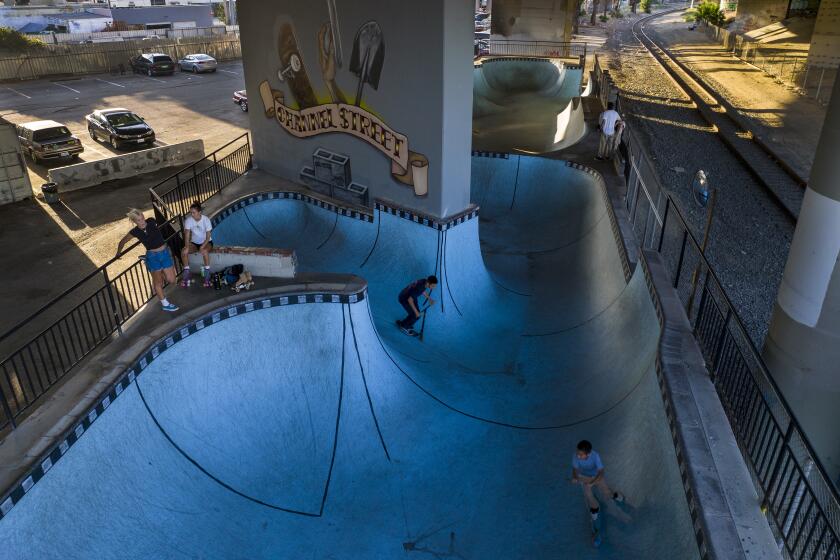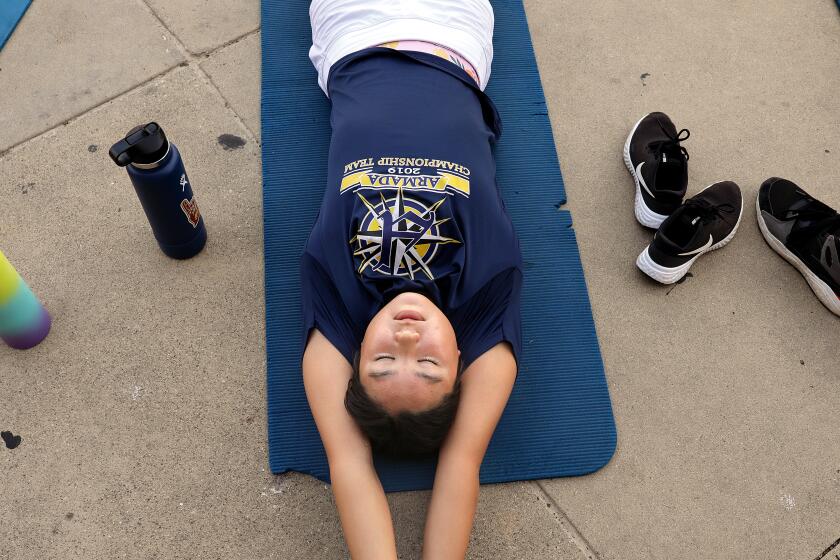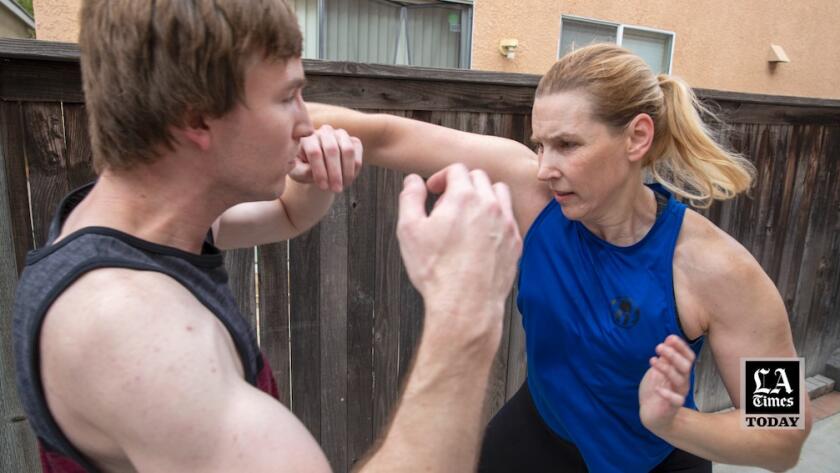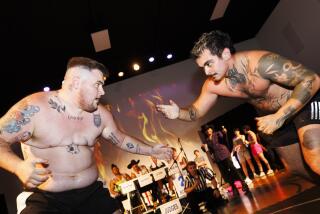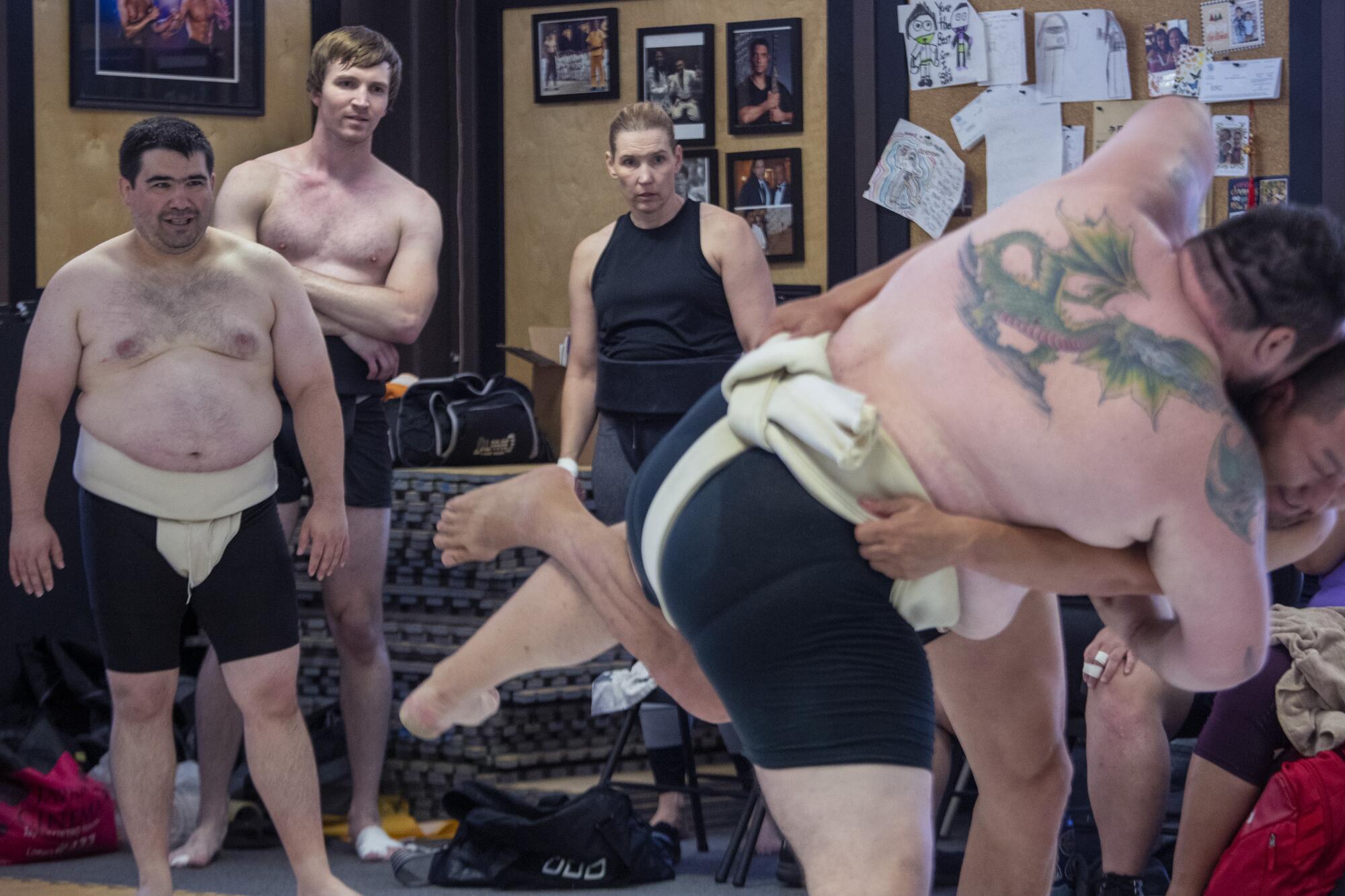
- Share via
The country’s best sumo wrestlers practice kitty-corner from a 99-cent store in a Torrance strip mall. The floor in the rented dojo has just enough space for one ring made of a white plastic tarp with green foam pool noodles velcroed to the ground in a circular shape. Two parallel yellow lines in the center mark the starting position.
Tall women weighing close to 300 pounds alongside thin men who check in under 180 circle up for stretches. A 10-year-old boy joins with a shy smile.
This sumo wrestling is not the cliched images of 600-pound men in nothing but top knots and loin cloths.
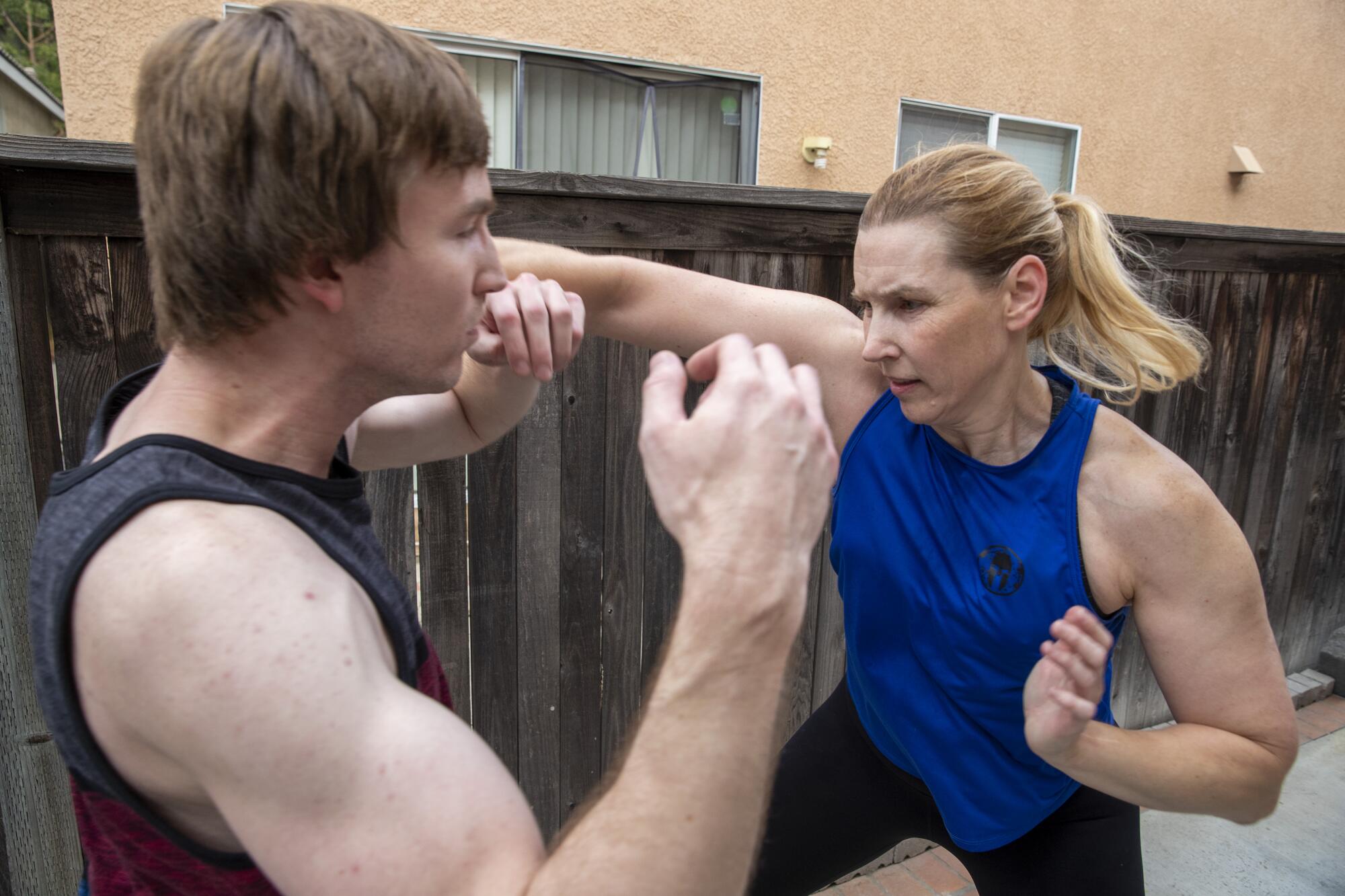
The sport at the international level is inclusive for all shapes, genders and ages, so much so that it’s turned into a family hobby for Jenni and Josh Crook, a mother-son duo who will represent Torrance’s Yamamoto Sumo Dojo at the U.S. Sumo Open. The world’s longest-running annual sumo competition outside of Japan takes place Saturday at Walter Pyramid in Long Beach, featuring competitors from Japan, Mongolia, Australia, Poland and the United States.
Since joining sumo in January after watching Josh, 26, wrestle for several years, Jenni will compete at the U.S. Sumo Open for the first time. It’s not the first time the 50-year-old nurse has copied a sport from her son. When the family lived in Alabama, Jenni joined an adult gymnastics class, passing the time between Josh’s team practices by learning back handsprings on a long trampoline and swinging giants on the strap bar. She’s competed in co-ed sand football and indoor rowing and completed Spartan races and Tough Mudders.
When his mom asked to join sumo, Josh wasn’t worried about whether she could handle the taxing sport. He’s seen her break fingers and toes from her other athletic exploits and worried she’d get hurt again. Jenni’s colleagues point out she’s always carrying some type of injury. But she laughs it off.
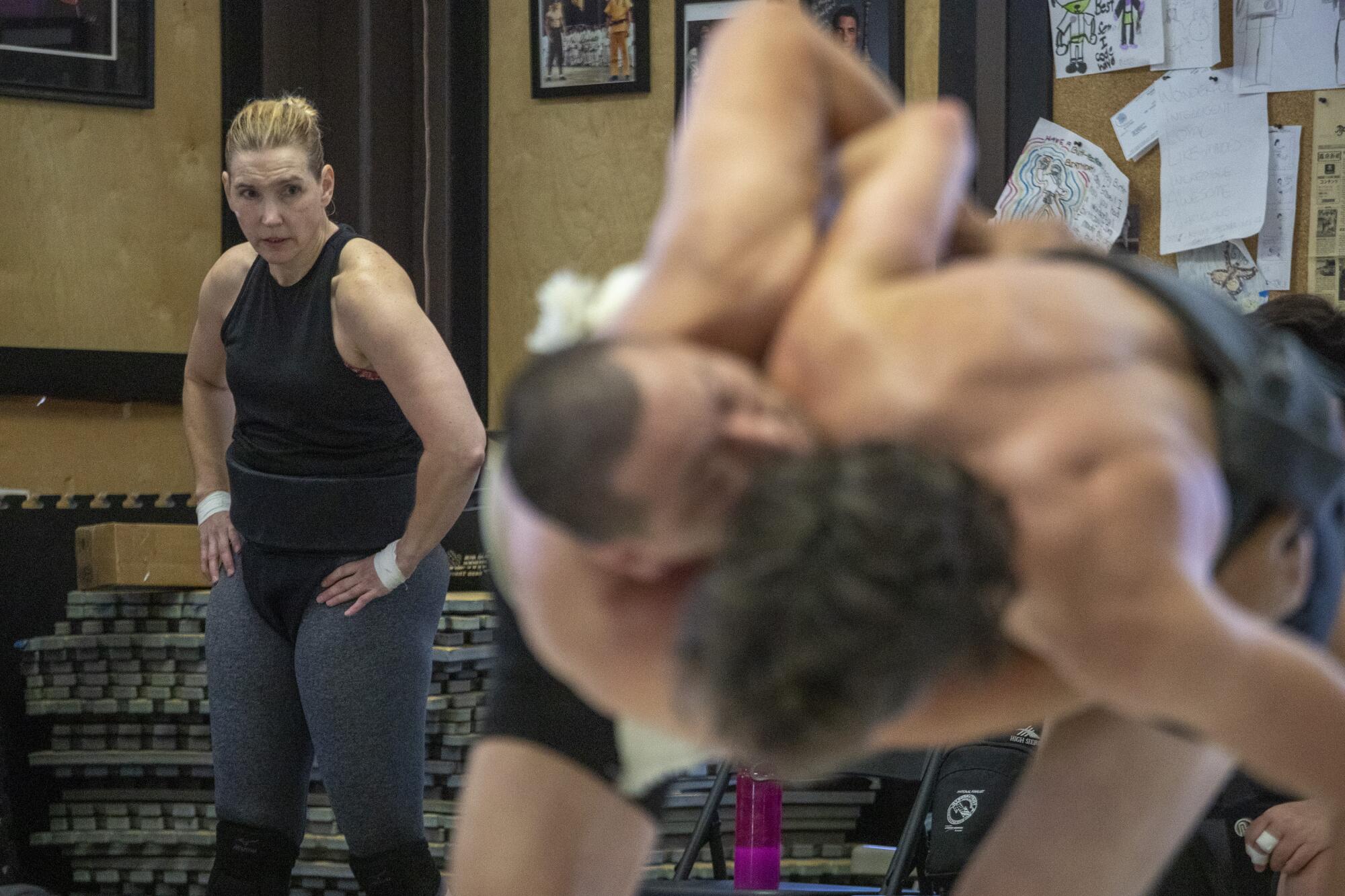
“It keeps you young,” Jenni said, peeling off athletic tape from her thumbs after a recent practice.
Of all the sports she’s tried, the 5-foot-10, middleweight mother of three feels she’s perfect in sumo. Each bout is a blend of power, balance and flexibility as competitors try to knock each other down or out of the ring. While each matchup can only be seconds long, it’s an efficient full-body workout that leaves wrestlers wiping sweat away after just their warmup of deep squats, each followed by a controlled leg lift.
The three-hour weekend practices proceed with bouts as teammates step into the ring to spar. Matching weight classes is not required. The sessions are free of competitive ego. Each matchup is about learning, sharing techniques and allowing teammates to experiment with new moves. Ryuichi Yamamoto, a 600-pound retired pro who still dresses the part in his mawashi loincloth and top knot for practice, coaches from the corner, giggling and shouting instructions as his students grapple and shove.
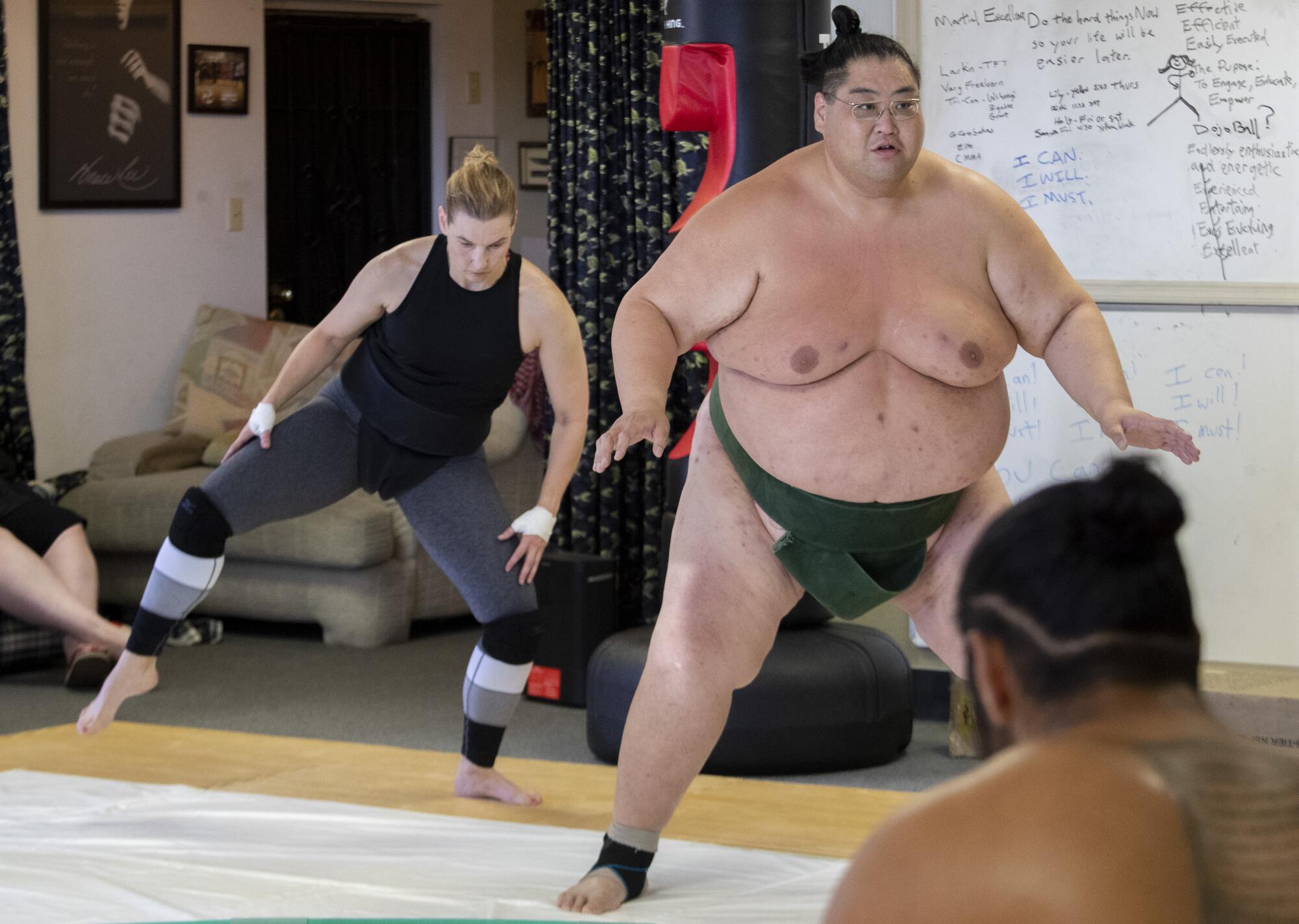
This is Yaleidy Galindo’s first contact sport. The 39-year-old heavyweight played volleyball and, briefly, participated in track and field before learning about sumo through her husband, Jose, who is the two-time reigning U.S. Sumo Open heavyweight and open weight champion.
Galindo was just an observer at first. She always made excuses for not participating in practice. Often larger than other women she was competing against, she long worried about hurting people.
But once she stepped into the sumo ring, she quickly discovered that wasn’t a problem in a dojo where everyone treats one another like family.
“To be able to see the women that are consistently going to tournaments, being there, it’s a very surreal experience,”
— Sumo wrestler Yaleidy Galindo
“I know if I give it my full 100%, I don’t have to feel bad because it is what the sport entails,” Galindo said. “You can use your natural abilities and your strength and it’s still OK to do that. No one’s going to get upset about it.”
The Yamamoto Sumo Dojo’s female roster is short, but dominant. Galindo, Jenni Crook and teammate Kellyann Ball all made the U.S. national team for the 2022 World Games, an International Olympic Committee-sponsored event that happens every four years. Ball won the national championship in the women’s heavyweight division in April while Galindo took second. The heavyweights switched medals in the openweight division, in which Yamamoto Sumo Dojo swept the podium as Crook, competing in her first sumo competition, added a bronze medal in the openweight to her middleweight gold medal.
Sumo, Japan’s national sport that has more than 1,500 years of history, forbids women from competing in pro sumo or participating in the sport’s traditional lifestyle that requires wrestlers to live and train in sumo stables. Women are barred from even touching the wrestling ring at a pro match.
For years, skateboarders had enjoyed a DIY skate park they created in an old parking lot. When the park got shut down, the skaters fought to get it back.
But the U.S. Sumo Open, which began in 2001, has included women’s divisions in all but one year. U.S. Sumo Open director Andrew Freund proudly calls the tournament a pioneer in women’s sumo.
“To be able to see the women that are consistently going to tournaments, being there, it’s a very surreal experience,” Galindo said.
Sumo earned full recognition from the International Olympic Committee in 2018, opening the possibility that it could be added to the Olympics one day. But that goal is still a far-gone dream as the sport hopes to grow international participation with modern weight classes and equitable gender opportunities.
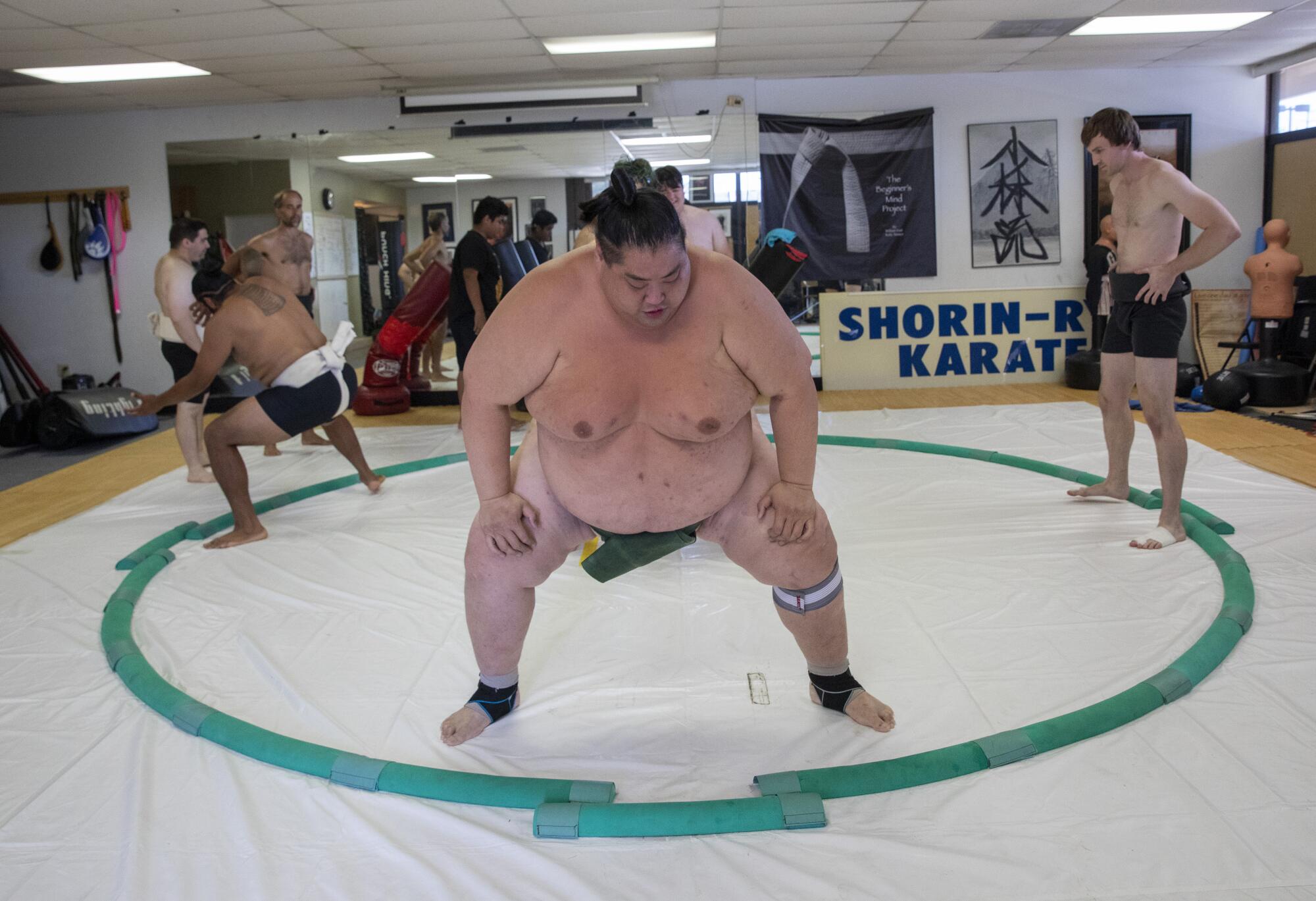
Seeing the different sizes in the gym surprised Josh Crook when he first started in 2019 after a friend invited him to the U.S. Sumo Open and he learned there was a local sumo club. The 6-foot-4 lightweight does not appear to be made for sumo, a sport in which people with low centers of gravity generally thrive.
But he has won two silver medals at the U.S. championships, including this year’s event in Salt Lake City. He has natural balance and flexibility from his gymnastics background. Using his long reach, Crook can take his opponent’s belt and pull them down.
The wrestling styles at the Yamamoto Sumo Dojo are as diverse as the types of people who walk through the door. Some wrestlers rely on belt work. Others practice maneuvers to trip or throw their competitors. Others win by repeatedly pushing their opponent’s throat back with an open palm.
La Mirada swimmer Kayla Han went from unknown teenager to budding star at the 2021 Olympic trials. She now confronts loftier expectations.
Watching the towering 600-pound Yamamoto, who started teaching amateur sumo wrestlers in the United States 10 years ago, rise from a metal folding chair to demonstrate the throat-thrust technique on a student makes an onlooker’s muscles tense up.
The teaching of the retired pro better known as “Yama” is the secret to the small gym’s success. Yamamoto, who has appeared in movies and TV shows including “John Wick 2” in his post-competition career, is a master at identifying each student’s strengths and elevating their style.
His namesake dojo claimed 12 individual medals at the U.S. national championships in April, including gold medals in men’s lightweight and heavyweight and women’s middleweight, heavyweight and openweight. In advance of the U.S. Sumo Open, top international competitors flocked to the Torrance facility for training.
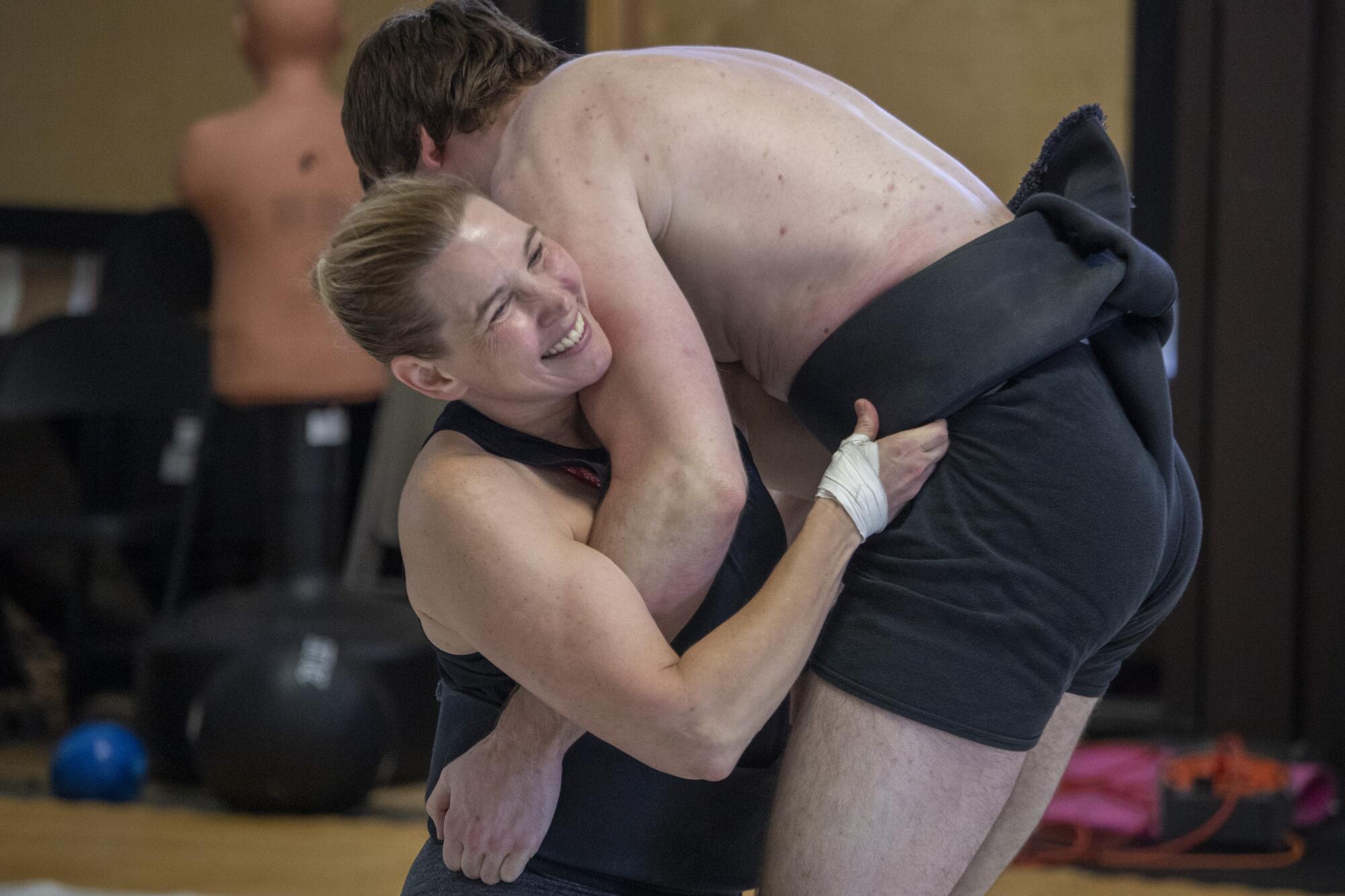
Japan’s Takeshi Amitani, who has won the U.S. Sumo Open championship in middleweight and openweight, led the group’s final practice before the big competition, sparring with anyone who stepped forward and adjusting his technique accordingly to ensure the students get a chance to practice new techniques. In sessions like these, he’s at just 5% of his capacity.
A worthy challenger approached Mongolia’s Mendsaikhan Tsogt-Erdene. The heavyweight who finished fourth in the World Games this year crouched down in his starting position and placed his fists behind the yellow line across from the 10-year-old boy. On the signal, the boy lunged toward the former junior world champion, who grunted as he took a half-step back in his wide stance. The boy attacked again, pushing Tsogt-Erdene’s belly until the 300-pound 24-year-old dramatically tumbled out of the ring.
“Oh,” the adults marveled. “So strong.”
- Share via
Watch L.A. Times Today at 7 p.m. on Spectrum News 1 on Channel 1 or live stream on the Spectrum News App. Palos Verdes Peninsula and Orange County viewers can watch on Cox Systems on channel 99.
More to Read
Go beyond the scoreboard
Get the latest on L.A.'s teams in the daily Sports Report newsletter.
You may occasionally receive promotional content from the Los Angeles Times.
